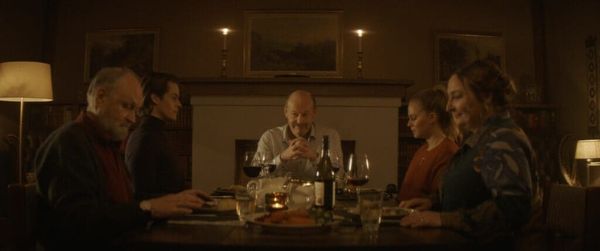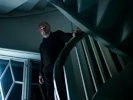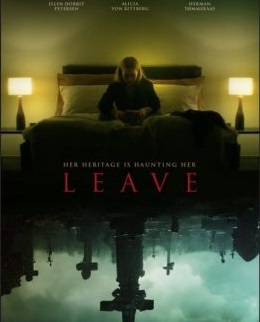Eye For Film >> Movies >> Leave (2022) Film Review
Leave
Reviewed by: Jennie Kermode

Cross-cultural misunderstandings about in Alex Herron’s atmospheric fable about a young woman looking for her roots in a far-off land. A thriller dressed up as a horror film, perhaps to please Shudder, Leave is the first serious venture into fiction for the director, who is best known for his music videos – and, indeed, it uses the black metal scene as a backdrop in places. Although most of the action takes place in his native Norway, it’s mostly filmed in English, which other characters speak for the benefit of its American-born heroine, and is squarely aimed at an international audience.
She is Hunter (Alicia von Rittberg), found in a graveyard as a baby in an overblown opening scene which might have been lifted from one of Herron’s videos. The cross around her neck is interpreted as a Satanic symbol and causes consternation, but Raylan (Clarence Smith), the man who finds her, is undeterred and adopts her himself. Though Smith has little screen time, there’s a natural chemistry between the two actors which persuades us that they have a close, loving relationship – so much so that she can’t bear to tell him about her longing to discover her biological origins. After saying goodbye to him prior to driving to Georgetown for college, she takes a detour and catches a plane, planning to spend a few days in Norway chasing up the results of a DNA test.

Initially, this proves difficult. People don’t seem to want to talk about her mother, Anna (Maria Alm Norell), and before long she learns that it’s because she disappeared. In fact, her mother’s boyfriend Kristian (Morten Holst) is a long term psychiatric patient, believed to have killed her. It’s distressing news for a young woman whose sheltered life has left her unprepared for the cruelties of the wider world, but she bears up well, deciding to continue her quest nonetheless and accepting an invitation to stay with her biological grandparents, Torstein (Stig R Amdam) and Lillian (Ragnhild Gudbrandsen). They are part of a close-knit clan inhabiting a small village where life revolves around the church and traditional forms of labour. Hunter’s cousin, Stian (Herman Tømmeraas), makes no secret of his frustration with this small world, but his willingness to exploit Hunter for his own ends means she cannot be sure if she can trust him, even as she begins to suspect that something is wrong in this picture postcard setting.
What follows owes less to the tradition of Midsommar and Sacrifice, which expand on Scandinavian traditions to scare prospective tourists, and more to the internally-focused wave of films and books which have been emerging from the social margins, over the past two decades, to criticise conservative elites. Though there are hints at supernatural influence, the horror stems entirely from human behaviour, its rootedness in patriarchal interpretations of religious ideas presenting a pointed contrast to Hunter’s female-focused quest to understand her origins. Ideas of heritage, duty and belonging come to the fore, whilst Hunter’s horror at the idea of committing aggressive acts – as distinct from an inability to do so – serves as a reminder that there are more sophisticated approaches available than simply trying to replace one person’s violence with another’s.
Well structured and benefiting from appropriately moody cinematography by Sjur Aarthun, the film is ably carried by the German-born von Rittberg. It stumbles a little at the end, which manages to be both rushed and dragged out, and the tacking on of horror trappings sometimes gets annoying, but there’s a solid story underneath which will appeal to many viewers regardless of genre. The title is clumsy, its justification clumsier, but don’t let that put you off. Herren has done well enough to leave viewers looking forward to his next narrative work.
Reviewed on: 02 May 2023
















